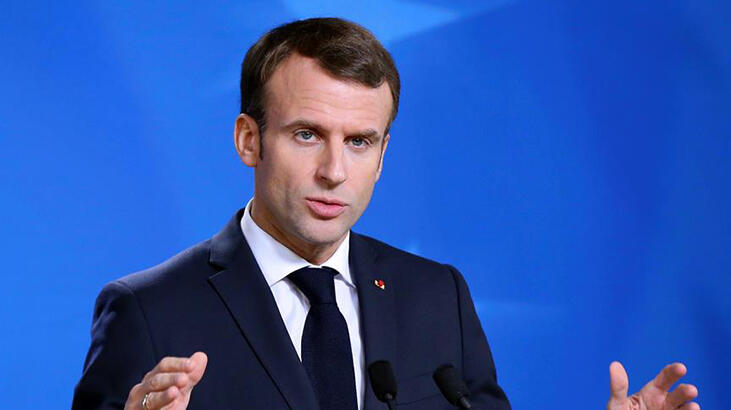ANKARA – Antagonist French President Emmanuel Macron’s drawing comparison between deceased teacher and Republic of France has cemented the opinion that the ongoing happenings in the country are nothing less than a bigotry against Muslims.
“He was killed precisely because he incarnated the Republic,” Macron told the funeral ceremony of Samuel Paty, the teacher who was beheaded last Friday.
Macron emphasized: “France will not give up our cartoons.”
This statement by Macron, whose words and actions in recent past have angered the world community particularly Muslims, draws an inch closer to the fact that French state under his leadership is at war with Islam and the Muslims.
It is not an isolated event that Paty died after stabbed by 18-year-old Abdullakh Anzorov who was shot dead by French police.
The statements like Macron’s have been instrumental in provoking Muslim community whose sentiments have been jeopardized by making of cartoons or things which are close to the Muslims.
According to French legal scholar Rim-Sarah Alouane, France is using Laïcité as waeapon against religious expression by any community.
“The changing interpretation of laïcité — which was first intended to guarantee a strict state neutrality and religious freedom — has led to a toughening of the legislative narrative on the visibility of religious signs,” she said.
What did Paty do? Paty, who taught history and geography, showed the cartoons of the Islam’s last Messenger Revered Muhammad (SAW) during a class on 6 October asking Muslim students to look away “if they thought they might be offended”.
Depictions of any such things is forbidden in Islam. In short, the teacher did not respect the sentiments of the Muslim students.
Prof Sami A. Al-Arian, who is Director of Islam and Global Affairs (CIGA) in Istanbul, says the action against Paty “is not accepted by any standards”.
However, Al-Arian added: “Paty knew exactly what he was doing. He was trying to provoke these students in the hope that somehow they will accept this act and feel less religious and this is very unfortunate.”
Two months ago, the notorious Charlie Hebdo magazine again angered the Muslim community all over globe by its threatening publication of similar acts as done by Paty.
France has the largest Muslim population in Europe – at least five million – and the community faced 1,043 Islamophobic incidents last year.
Alouane maintains that not a day goes by in France without a new case concerning the treatment of French Muslims.
Soon after the Paty’s incident, two Algerian Muslim women wearing Hijab were stabbed near the Eiffel Tower in Paris by two women who yelled “Arabs go home.” The incident did not trigger anger in Macron or his ilk nor did it find space in mainstream in French media.
Instead, French state launched state-wide raids on individual Muslims, Islamic schools and Muslim organizations.
If we look at the narratives built against Muslims, like using Niqab as a symbol of threat, they fall blank because 2,000 Muslim women are estimated to wear the niqab in the country.
“The potential threat to public order is negligible,” Alouane insisted.
It is not what Macron recently said “Islam was facing crisis” but it certainly is a deep national crisis in France when it applies laïcité against Muslims.
“Originally designed as a principle compatible with human rights, in which all individuals are equal regardless of their religion or belief, laïcité in France has since become a tool for political identity, and Muslim [in general] women are paying a high price for it. This new form of illiberal laïcité is a threat to human rights and religious freedom,” the French legal scholar noted.
The Islamophobia is witnessing a wider spread – from Europe to US to Asia where China and India are knee-deep in persecuting Muslims. And despite their public differences on the standards of electoral democracies, all these countries stand together cementing hatred against Muslims – their faith, culture, civilization and traditions.
According to global rights defender and journalist C J Werleman: “Linking Islam to terrorism and thus making Muslims the referent object in security discourse is not the sole domain of Indian mainstream politics, of course. Efforts to locate the religious belief in counter-violent-extremism and counter-terrorism strategies have become part and parcel in the UK, US, Europe and elsewhere.
“But what is particularly alarming is the way in which the dissemination of Islamophobic discourse has evolved over the course of the past four decades.”
He traces roots of Islamophobia to a neo-conservative and right-wing Israeli conference on international terrorism convened in Tel Aviv in 1979 which aimed at reaching an agreement in which right-wing Israeli political parties and members of the American Republican Party would begin rooting Palestinian liberation aspirations in terrorism discourse.
Around 1984 at the second International Conference on Terrorism held in Washington DC, the US neo-conservatives and the Israeli far-right anchored modern terrorism in Islamic and Arab radicalism.
“It was at this conference that Bernard Lewis, author of The Crisis in Islam, became the first public intellectual to overtly link terrorism to Islam by arguing that ‘Islam is a political religion’. Because terrorism is an act of political violence, the term ‘Islamic terrorism’ applied, while also arguing that the same couldn’t be said for Jewish or Christian terrorism,” Werleman’s research finds.
Thus, the right-wing Israeli and US political parties worked together to convince Western policy-makers that “Islamic terrorism” would replace Communism as the Western civilization’s next great threat, according to Werleman.
The CIGA director notes that words and actions of these so-called liberal statesmen do not match. “You have double standards applied to one faith over the another, to one nationality over the another and they do not see any contradiction.”
“What they fail to see is significance of the Prophet Muhammad (SAW) on the lives of almost 2 billion people around the world. They need to realize that they are certain things in life that people are ready to sacrifice for – their belief, religious figures – and there has to be respect,” Al-Arian explained.
Al-Arian said when Muslims used to conquer places where they were Churches, Crosses, “they kept everything”.
To defend the Muslims community, Turkey’s President Recep Tayyip Erdogan in a statement to Organization of Islamic Cooperation early this week said: “never allow for everyday political arguments to overshadow our understanding of the ummah (Muslim community) or harm the fellowship among us.”
He said many of the problems Muslims confront in social life are “due to a misunderstanding and mistaken teaching of Islam”.
There is need to form a strong and steadfast bond between the universality of our religion and the realities of everyday life, he added.
Erdogan slammed some Western countries for Islamophobic policies, saying such moves have “become a useful device to mask their own failures.”
“The latest examples of this would be the terms ‘French Islam,’ ‘European Islam,’ and ‘Austrian Islam’ being brought into the spotlight,” he said






